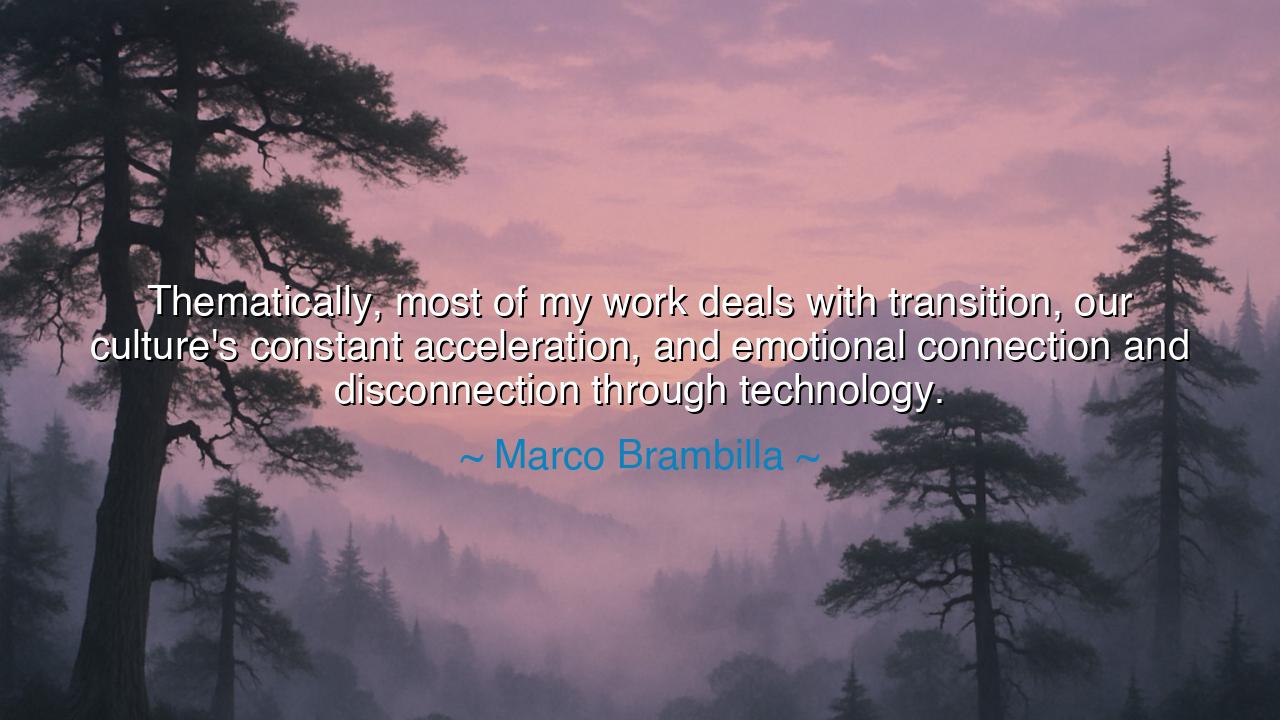
Thematically, most of my work deals with transition, our
Thematically, most of my work deals with transition, our culture's constant acceleration, and emotional connection and disconnection through technology.






In the words of Marco Brambilla, artist of vision and architect of modern spectacle, there is a reflection upon the heartbeat of our age: “Thematically, most of my work deals with transition, our culture’s constant acceleration, and emotional connection and disconnection through technology.” These words are not only an explanation of his art, but a mirror held to the times we live in. For he speaks of the restless shift of the human condition, the speed of change, and the paradox of being both more connected and more estranged than ever before.
The first truth Brambilla names is transition. Life itself is a series of transitions, but in our era, they come with the speed of lightning. What once took generations now takes only years—or even months. Old ways of seeing, of working, of loving are replaced in an instant. Brambilla captures this movement in his work, but it is more than art: it is the condition of every soul today. We live not in a steady landscape, but in a river, rushing us from one shore to the next, sometimes before we have learned the shape of the land we are leaving.
The second truth is acceleration. Never has humanity moved so fast. From the first wheel to the steam engine, from the telegraph to the smartphone, each invention has pushed us into greater speed. Today, news travels across the earth in seconds, voices are carried instantly across oceans, and the pace of change leaves many breathless. Brambilla’s words remind us that acceleration is not neutral—it changes how we see time, how we think, how we feel. What once could be savored is now consumed in haste, and this constant rush leaves us both exhilarated and exhausted.
But the heart of his reflection is on connection and disconnection. Technology binds us together in ways the ancients could only dream of. Families divided by oceans can speak face to face, strangers across continents can become friends, and vast communities can form around shared ideas. Yet this same power creates distance. For in our hunger to be everywhere, we are often nowhere; in our pursuit of constant connection, we may find ourselves lonely, staring into glowing screens that offer presence without presence. Brambilla captures this paradox: technology as both bridge and wall.
Consider the story of the telegraph, hailed in the 19th century as the end of distance itself. For the first time, words crossed continents in moments. Yet with this marvel also came anxiety—the fear that speed would cheapen conversation, that letters once written with care would be replaced by hurried fragments. The same paradox unfolds now with each new tool: greater reach, but often thinner bonds. Brambilla’s art, in naming this, is part warning, part meditation on what it means to be human in such a world.
The meaning of the quote is thus: art must hold a mirror to the soul of its age, and Brambilla sees ours as defined by relentless transition, unyielding acceleration, and the strange dance of intimacy and alienation born of technology. His words remind us that these forces are not merely external—they shape our inner lives, our relationships, and even our sense of self. To ignore them is to drift unthinking with the current; to face them is to seek wisdom amidst the storm.
The lesson for us is clear: embrace technology as a tool, but guard your humanity. Do not be swept blindly by acceleration, but pause, breathe, and claim time for reflection. Treasure connections that are real, and recognize when disconnection has crept in under the guise of constant contact. And when life thrusts you into transition, do not despair, but carry your values like anchors, so that even in the swiftest river, you remain true to yourself.
So let Brambilla’s words be remembered: we live in an age of movement, of speed, of paradox. Yet wisdom lies not in rejecting these currents, but in learning to navigate them with patience, balance, and heart. For though the world may rush ever faster, the soul still longs for what it has always longed for—truth, presence, and love.






AAdministratorAdministrator
Welcome, honored guests. Please leave a comment, we will respond soon